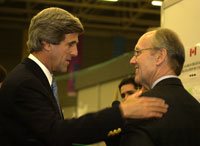THE HAGUE, Netherlands
If you walk straight out the front door of this convention hall and skirt the sandbagged dike that activists built during a weekend demonstration, you find yourself at the front door of a squat building with a U.N. flag flying from a pole. Enter it (past a pair of metal detectors) and you find yourself in the chambers of the International Criminal Tribunal for Yugoslavia, the first international war crimes trials since Nuremberg.
At any given moment, two or three different courtrooms are in session. Judges — clad in scarlet Rumpole-of- the-Bailey-meets- Star-Trek costumes — listen to the endless grim fallout of the Bosnian genocides. Leather-jacketed Serbian thugs sit impassively as prosecutors drone out the details of their crimes — “took her to the house at #16, where she was gang-raped by 15 of his soldiers, including vaginally, anally, and with fellatio.” The proceedings are horribly hard to watch, but moving as well: However laggard and impotent and selective in its attentions, the community of nations is nonetheless saying that the events that took place 10 years ago in muddy backwaters to people without power or position rise to the level of global concern.
If you want to understand exactly why these climate negotiations are so impossibly difficult — and so important even in their imperfect form — you need to think about that courtroom. What the Kyoto Protocol really represents is an attempt to convince nations to accept meaningful limits on their sovereignty over their economies. And the reason why the U.S. inevitably emerges as the villain in these talks, the one holding back every agreement, is that absolute sovereignty has done more for us than it’s done for anyone else, and so we are reluctant to let it go.
French President Jacques Chirac spoke to the convention on Monday, and for the most part reporters concentrated on his blistering attack on U.S. energy use. Americans use three times as much energy on average as the French, he said, so “it is in the Americans, in the first place, that we place our hopes of effectively limiting greenhouse gas emissions on a global scale.”
Chirac wrapped up his speech with language that may be even more important, however. With the Kyoto Protocol, he said, “humanity is for the first time instituting a genuine instrument of global governance … By acting together, by building this unprecedented instrument, the first component of an authentic global governance, we are working for dialogue and peace. We are demonstrating our capacity to assert control over our fate in a spirit of solidarity, to organize our collective sovereignty over this planet, our common heritage.”
It’s the sort of language that terrifies U.S. negotiators. They are intent on filling the treaty full of loopholes that would make American participation painless. As of today, they continue to insist on language that would allow an enormous percentage of our emissions cuts to come from credit we’d get for our existing forests. In fact, their strategy for ratification is clearly to add enough goodies to the text — credit for farmers if they change the way they plow fields, for instance — that a coalition of senators in some future Congress would actually vote for it. (Sen. John Kerry, the Massachusetts Democrat, said yesterday that one or two elections out, the composition of the Senate might change sufficiently to allow discussion of the treaty.)
But if and when that debate finally comes, it will clearly focus on these questions of sovereignty — on whether or not the rest of the world can demand that the U.S. change the fuels that underwrite its massive economy. Will climate change be perceived as a serious enough threat that we will agree to surrender absolute autonomy over our economy — not to a client agency like the World Trade Organization that simply offers an easy way to spread our power, but to a truly international regime that sets specific limits on what we can and cannot do?
So far, there’s no great reason for optimism. We can hardly be bothered to pay our bills at the U.N., even though we exercise an ironclad veto over any ideas that might emerge from that body. We have found ourselves virtually alone in refusing to sign on to a number of international accords on everything from land mines to the Law of the Sea. As for that tribunal meeting across the way, an attempt supported by almost the entire world to set up a permanent international court to hear cases of human rights violations has been stymied by American refusal to go along. We have said — literally — that we won’t support such a court unless it exempts Americans from its jurisdiction. “I will oppose it as long as I have breath in my body,” Sen. Jesse Helms (R-N.C.) said recently.
We want concessions almost as thorough from this treaty, and given our willingness to wreck the process otherwise, we may well get them. Still, though it will probably take a savage hurricane or two to finally unlock the politics, it seems likely that sooner or later the U.S. really will be forced to come to grips with the idea that we live on a planet where borders no longer mean what they used to.
The chemistry and physics of global warming simply do not allow for utter sovereignty, and that message is slowly sinking in. The unlikeliest words of the entire week may have come from Idaho Sen. Larry Craig (R), who is as right-wing as they come. He said he had come to accept much of the science of global warming, and hence at least the rationale behind the Kyoto process, if not the treaty itself. “We are fumbling our way towards finding a world community in which our sovereignties are held whole,” he said. “Fumbling” is clearly the right word, but it is better than nothing.
Behind Closed Doors
It’s the U.S. (and Canada, Australia, and Japan) against the world on the issue of carbon sinks. Reports from the closed-door sessions yesterday indicated that other nations were still balking at American demands for extensive credits for our forest lands — and that the U.S. was balking right back. “They basically seem willing to hold the whole talks hostage,” said one observer from a non-governmental organization.
In the end, most watchers predict that some kind of mathematical formula will end the standoff — the U.S. will agree to discount the carbon sequestration it claims from its forests and soils by some percentage. How high that percentage will be depends on how tough the rest of the world hangs,
and how weary everyone gets waiting for us to budge.




